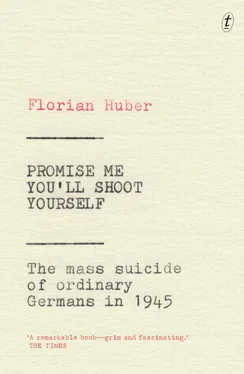The bureaucratic notion of using questionnaires to distinguish Nazis from non-Nazis failed. Membership of a Nazi organisation such as the civil servants’ league, the teachers’ league or the motor vehicle corps was no indication of the extent of a person’s involvement in the Nazi system, and neither was their rank. Whether innocent or guilty, Germans did not consider such information sufficient evidence to support a lay judge’s verdict for or against them. Many regarded denazification as an absurd theatre of injustice—and as a threat to their families and futures, leading as it often did to imprisonment, or exclusion from their previous professions.
When Melita Maschmann appeared before the court of arbitration during her internment in the women’s camp at Ludwigsburg, she vehemently disputed the judges’ right to assess her case. She saw the German judges as henchmen of the occupying powers, accusing her not of any crime, but of fighting for a political ideal. She scorned the idea that it was possible to determine guilt or innocence by bureaucratic means. ‘I despised those courts of arbitration so much that I wouldn’t have hesitated to fight them with every lie and trick in the book, if I’d thought it necessary,’ she said.
Charged with being a ‘major offender’, Maschmann did everything in her power to be ranked a follower instead. She had no qualms about bringing her rhetorical skills to bear to get the judges on her side, and the success of this strategy left her acutely aware of Germany’s political helplessness. The court found Melita Maschmann guilty of poisoning the minds of the young people of Germany with her work for the Hitler Youth, but she got off with a light sentence.
• • •
Gerhard Starcke’s decision to submit to denazification was practical rather than moral: he was keen to work as a journalist in postwar Germany and thought serving time in prison a wiser move for his future career than going underground like some of his comrades. He acted entirely strategically. Having turned away from the church in the early 1930s, he began to get involved again while in the camp at Neuengamme. ‘I saw my return to the Protestant Church as another way to speed my release.’
Because Starcke had been a party member and worked in propaganda, his denazification was long and drawn-out. He was just going through the motions; it would never have occurred to him to question seriously what he had done. All the same, he must have been surprised when the court of arbitration found that he had been a follower who had lent no substantial support to the Nazis. ‘The English can’t have probed very deeply,’ he would later comment. Now he began a second life, in provincial West Germany, unshadowed by the past. He continued to work as a journalist. Nobody asked him about his early writings. His autobiography of more than four hundred pages ends on a note of near incredulity: ‘However bleak and sad things may have looked when I was released from Neuengamme in 1947, they soon took a rapid and quite spectacular turn for the better.’
The Third Reich may have splintered into millions of pieces as it went down, but it was not without a legacy. A new community of suffering was born out of the shared experiences of hunger and cold; a community of victims emerged from the sense of betrayal, injustice and helplessness; a community of interests sprang up as reconstruction began. Wherever she went in Germany, Hannah Arendt saw people working away, even on Saturdays and Sundays. It was as if they were under a kind of compulsion to keep themselves busy, toiling away from morning to night. There was something unnerving about the speed at which the Germans had got back into their hardworking routines.
Watching the Germans busily stumble through the ruins of a thousand years of their own history, shrugging their shoulders at the destroyed landmarks or resentful when reminded of the deeds of horror that haunt the whole surrounding world, one comes to realize that busyness has become their chief defense against reality.
The great appeal of the ‘zero hour’ metaphor that was adopted for 1945 was its twofold promise: on the one hand, the severing of all ties with an overwhelming past, and on the other, a fresh start for a society that felt its downfall absolved it of responsibility for its actions. The idea of a ‘zero hour’ encouraged the revival of the old psychological metaphor of the inner rift. As in the Nazi years, the people of Germany acted as though a part of reality didn’t exist. This time they were in denial about their own history.
In the sober atmosphere of postwar Germany, the frantic emotions of the Third Reich felt like a stale and aberrant memory, discredited by the shock of reality. As Hannah Arendt travelled the country, she found no genuine expression of feeling, not even grief at the loss of friends and family. It was as if all emotion had been replaced by assiduous detachment, or trite sentimentality. Arendt had been studying the young Federal Republic for eight months when she left in March 1950. It had been a painful reunion. She wanted to cry out, to tell the Germans: ‘But this is not real—real are the ruins, real are the past horrors, real are the dead whom you have forgotten.’ But they were living ghosts, she said, ‘ghosts whom speech and argument, the glance of human eyes and the mourning of human hearts no longer touch’.
Renate Finkh was nineteen when the war ended. Hitler’s suicide had left her almost unmoved, but she was still loyal to the Nazi cause; she was determined to stay the same old Renate. The world around her and the people in it had changed, though—so much so that she ‘hardly recognised anyone’.
She could no longer stand the company of her family and left to find herself a job on a farm. After keeping his hatred of Hitler a secret for twelve years, the farmer could finally express his pent-up anger, raging about German megalomania and the torture and extermination of thousands, even millions, in the concentration camps. Renate refused to believe him, just as she had refused to believe the photographs of heaped corpses in the newspapers and on billboards. All lies, she said to herself. The good she had done was being lied away. All summer long, she had to listen to the farmer’s fierce triumph as he poured scorn upon her former idols. ‘I had to keep silent. My family were frightened. They begged and begged me not to upset anyone.’
But if Renate Finkh kept silent, she also swore to write everything down, so that her children would know of the fire that had burned within her, of the faith that had been more for them than for herself. There were, of course, truths that even faith could not deny. Her brother-in-law Werner had been killed late in the war, leaving her sister alone with their three children. Her brother’s wife was dead, her brother in a prison camp, and their son practically an orphan. Her father’s goldsmith’s shop had burnt down. Disappointment and exhaustion had carved deep furrows in all their faces. No one wanted to hear about the fire of faith anymore.
Renate moved back to her hometown with her father, leaving her mother in the countryside with her sister and the children. Her father had grown lonely, taciturn and grumpier than ever. In the house he had built all those years before, in happier times, he and Renate lived their separate lives, no longer able to talk to each other. Renate couldn’t understand why he suddenly renounced his former beliefs. Even when her brother came home from the POW camp, there wasn’t a lot to say. Andreas packed his things and went on his way to see his mother and son. The father’s joy at seeing his son again was marred by silence.
Eventually, Renate Finkh could no longer evade reports of the Nazis’ crimes. In her father’s silence, in her own silence, she tried to find peace. She came to accept that her search for a sense of safety and belonging had trapped her in a big lie. All this time she had been pursuing a chimera, trying to escape reality, but she had gained nothing, and instead lost even herself.
Читать дальше












